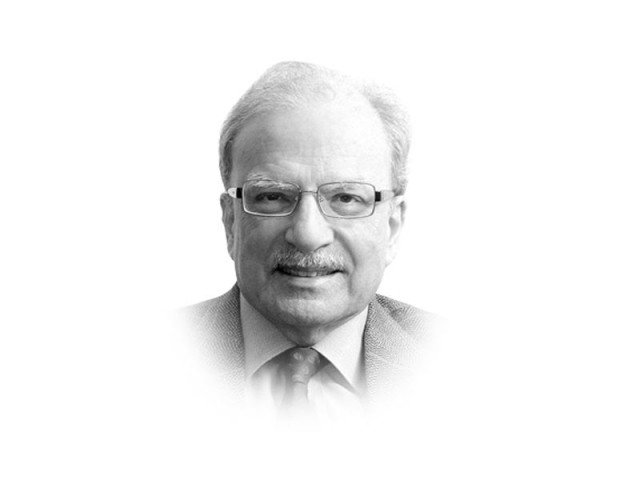Possible results of Trump’s Afghan approach
Trump’s speech may therefore create a quasi-autonomous state in the Pashtun areas on the Afghan side of the border

The writer is a former caretaker finance minister and served as vice-president at the World Bank
First, the on-going war in Afghanistan will not have a clear winner for years to come. There will be more destruction and more contestants will be drawn into the fray. These will probably include the Islamic State (IS) as that organisation of extremists, squeezed in Iraq and Syria, seeks new grounds for its continued existence. A troubled Afghanistan will offer an attractive place from where to launch operations possibly into South Asia. The IS could also find the ground in the Indian-occupied Kashmir throwing the welcoming mat.
Second, the Americans are unlikely to extend their stay in Afghanistan for any length of time. The strategy announced by President Trump was drafted by the senior military personnel who have joined his administration. The militarisation of the approach would not have civilian support, at least of the people who were behind the president’s ‘America First’ thinking. Some of these people — Stephen Bannon and Sebastian Gorka, for instance — have been pushed out of the White House by the president’s military associates. They have, however, not lost their influence in the Trump camp and are debating the wisdom of the Afghan policy. The August 21st speech, therefore, may not be the final word. President Trump has not shown perseverance to be one of his strengths. He is likely to get tired of the course he has set for himself and his administration and call off the American involvement in Afghanistan.

Third, in the meantime, the American rift with Pakistan will most likely become unbridgeable. This will be the case in particular if Imran Khan, not keen on keeping Pakistan closely aligned with the United States, gains political strength in the country. He has not made any secret of his desire to pull out of the US orbit.
Fourth, Pakistan will get even closer to China as Beijing extends its reach in the country by way of the One Belt, One Road (OBOR) initiative. The OBOR will prove to be a game changer for Pakistan even if the absence of peace in Afghanistan does not yield its full potential. Pakistan’s delinking from America and India’s drawing closeness to that country will reorder geopolitics in South and Central Asia. While the United States and India could become the main building blocks of what Donald Trump in his speech passingly referred to as the Indo-Pacific configuration, China, Russia and Pakistan may come together as partners in the other geographic configuration.
Fifth, it is not totally unlikely that Iran will join this grouping, especially if the Trump administration continues in its attempt to isolate that country. From the perspective of the Muslim world, this may not be an unwelcome development as it will soften the sectarian divide that has been exacerbated by Trump’s Washington. The US president’s May speech in Riyadh, Saudi Arabia, was read as an invitation to the Sunni world to align itself with the United States in the latter’s distrust of Tehran.
It is the sixth consequence of Trump’s Afghan strategy that may prove to be most distressing. The pressure on Pakistan to do more to eliminate radical Islamists from its soil may produce an unintended result. The Pakistani military has been active in doing precisely that for the last couple of years, especially after the Afghan-based Taliban’s attack on an army school in Peshawar. The attack in December 2014 resulted in the launch of an operation by the country’s military on the Pakistani side of the border. In a conversation with me in May 2015, Ashraf Ghani said that the Pakistanis, while cleansing their areas of militants, have shoved the “world’s filth towards us in Afghanistan.” The reference was to the Islamists from Central Asia and Russia who had gathered in Pakistan’s North Waziristan to wage war against their perceived enemies. Dislocated, they have established havens in the border regions of Afghanistan. These are peopled by Pashtun tribes, a fact not fully comprehended by the West’s policymakers.
The Taliban are Pashtuns. Numbering about 42 million, this ethnic group is divided between Pakistan and Afghanistan. Pakistan has 26 million Pashtuns, Afghanistan about 14 million. The remaining two million are spread over the world, in India and the Middle East. Like the Kurds in the Middle East, the Pashtuns have a distinct culture, language and history. If they are not made part of the Afghan polity and economy, which can be done by bringing in the Taliban into the system, they may create a political entity of their own, separate from the Afghan state. Unlike the Kurds, the Pashtun are strict observers of the Islamic faith. Their political entity would have a definite Islamic identity. Trump’s August speech may therefore create a quasi-autonomous state in the Pashtun areas on the Afghan side of the border pursuing a strong and uncompromising Islamic ideology. If that were to happen, there will be serious problems for both Afghanistan and Pakistan.
Published in The Express Tribune, September 5th, 2017.
Like Opinion & Editorial on Facebook, follow @ETOpEd on Twitter to receive all updates on all our daily pieces.















COMMENTS
Comments are moderated and generally will be posted if they are on-topic and not abusive.
For more information, please see our Comments FAQ